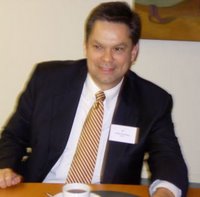 US patent reform comes to London
US patent reform comes to LondonThis year’s Stephen Stewart Memorial Lecture took place last night. Organised by the Intellectual Property Institute and hosted at the offices of Slaughter and May, this annual showpiece talk, chaired by Sir Hugh Laddie (below, left), was delivered by AIPLA President William Rooklidge (right) who spoke on ‘Reform of Patent Laws: the US Experience in Forging Legislation from Disparate Interests’.
 Mr Rooklidge reviewed the main areas of law reform that the AIPLA is pressing for. One of the most contentious of these is that the patent should be awarded the the first inventor to file (an American euphemism for 'first-to-file'), not to the first to invent. Other reforms which will be greatly welcomed both inside the US and outside it are the abolition of the requirement that the patent applicant disclose the 'best mode' of putting his invention into effect, the simplification of what constitutes prior art, the abolition of the anomalous entitlement of applicants for US-only patents to opt not to have their patent applications published after 18 months, the removal of the subjective element in a claimant seeking to prove "wilful infringement" in order to secure costs and triple damages and the introduction of a nine-month post-grant opposition period. All of this will make US law more closely convergent with the law in Europe and indeed most of the rest of the world.
Mr Rooklidge reviewed the main areas of law reform that the AIPLA is pressing for. One of the most contentious of these is that the patent should be awarded the the first inventor to file (an American euphemism for 'first-to-file'), not to the first to invent. Other reforms which will be greatly welcomed both inside the US and outside it are the abolition of the requirement that the patent applicant disclose the 'best mode' of putting his invention into effect, the simplification of what constitutes prior art, the abolition of the anomalous entitlement of applicants for US-only patents to opt not to have their patent applications published after 18 months, the removal of the subjective element in a claimant seeking to prove "wilful infringement" in order to secure costs and triple damages and the introduction of a nine-month post-grant opposition period. All of this will make US law more closely convergent with the law in Europe and indeed most of the rest of the world.The focus of the talk then shifted to the AIPLA's opponents - the Business Software Alliance (who wanted tougher provisions on injunctions) and the various groups representing private inventors (who broadly speaking like the law as it is and have no wish to amend it). Mr Rooklidge discussed topics as diverse as the calculation of infringement damages where the infringed product is only a minor component of a successful commercial product, the desirability of members of the public being able to engage in the application process as third parties by communicating prior art information to the USPTO and the abolition of the "inequitable conduct" defence.
The IPKat thought Mr Rooklidge stated his case very well. He certainly gained a lot of supporters in England last night. Whether he can sway the US Congress sufficiently to pass HR 2795 is however another matter.
Another batch of copyright cases has just been reported in Sweet & Maxwell's bimonthly European Copyright and Design Cases. Legal decisions reported in English include Pierre Hugo and others v SA Plon and another (Cour d'appel de Paris) on whether the moral right of the long-dead Victor Hugo was infringed by the unauthorised publication of two sequels to Les Miserables involving characters from the original. There are also cases from England, Scotland, the European Court of Justice and the OHIM Designs Invalidity Division.
















I was there too and thought it a very good event (nice hospitality too: those slaughters people are very generous with the nibbles ... could do with wider choice of beer though). But why were so few people from the patent professions there to hear the guy? Don't they realize how much these proposed changes will affect them?
ReplyDelete